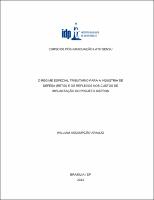Use este identificador para citar ou linkar para este item:
https://repositorio.idp.edu.br//handle/123456789/3270| Título: | O regime especial tributário para a indústria de defesa (RETID) e os reflexos nos custos de implantação do projeto SISFRON |
| Autor(es): | Araujo, William Assumpção |
| Orientador(es): | Meira, Liziane Angelotti |
| Palavras-chave: | RETID;Projeto SISFRON;Implantação;Custos tributários |
| Editor: | IDP/EAB |
| Citação: | ARAUJO, William Assumpção. O regime especial tributário para a indústria de defesa (RETID) e os reflexos nos custos de implantação do projeto SISFRON. 2013. 48 f. Monografia de Especialização (Pós-graduação Lato Sensu em Direito Tributário e Finanças Públicas) Instituto Brasileiro de Ensino, Desenvolvimento e Pesquisa, Brasília, 2021. |
| Resumo: | Esta pesquisa tem como objeto o Regime Especial Tributário para a Indústria de Defesa
(RETID), instituído por intermédio da Lei nº 12.598, de 22 de março de 2012, buscando
identificar os possíveis reflexos desse regime, após a sua regulamentação, na
implantação do Sistema Integrado de Monitoramento de Fronteiras - SISFRON. Os
objetivos foram: avaliar o Regime Especial Tributário para a Indústria de Defesa e
identificar os reflexos nos custos de implantação do Projeto SISFRON. A fim de
atingir esse objetivo, foram estabelecidos os seguintes objetivos intermediários:
identificar os beneficiários diretos e indiretos do Regime Especial Tributário para a
Indústria de Defesa, bem como os tributos abrangidos por esse regime tributário
especial; quantificar percentualmente a suposta redução de custos nas
contratações, em razão dos benefícios tributários; e delimitar o período de tempo
durante o qual os benefícios do Regime Especial Tributário para a Indústria de Defesa
poderão ser usufruídos. Em face da complexidade do objeto do estudo, este foi
desenvolvido de forma qualitativa, tendo sido realizada pesquisa instrumental, com
base na legislação e doutrina nacionais, sobre os principais aspectos envolvidos no
Regime Especial Tributário para a Indústria de Defesa. Os resultados principais do
estudo demonstraram a necessidade da regulamentação da Lei nº 12.598/2012, sob
pena de se inviabilizar a avaliação dos reflexos do Regime Especial Tributário para a
Indústria de Defesa nos custos de implantação do Sistema Integrado de Monitoramento
de Fronteiras. |
| Abstract: | This research has as its main object the Special Taxation Regime for the Defense Industry established by the law number 12.598 of 22 March 2012, seeking to identify the possible reflections of this regime after its regulation in the implementation of SISFRON (Integrated Border Monitoring System). The main goals were to evaluate the Special Taxation Regime for the Defense Industry and to identify the reflections on the costs of SISFRON implementation. In order to reach this objective the following secondary objectives were established: To identify the direct and indirect beneficiaries of the Special Taxation Regime for the Defense Industry as well as the taxes covered by this Special Taxation Regime, to quantify percentually the alleged reduction in costs of hiring due to tax benefits, to delimit the period of time in which the Special Taxation Regime benefits can be enjoyed. Considering the complexity of the object of this investigation, this was developed by qualitative form; instrumental research has been carried out based on the National Legislation and Doctrine on the main aspects of the Special Taxation Regime for the Defense Industry. The main results of this study highlighted the need of regulation of the law number 12.598/2012, under the penalty of deterring the reflections evaluation of the Special Taxation Regime for the Defense Industry and the costs of the Integrated Border Monitoring System. |
| URI: | https://repositorio.idp.edu.br//handle/123456789/3270 |
| Aparece nas coleções: | Outras Especializações |
Arquivos associados a este item:
| Arquivo | Descrição | Tamanho | Formato | |
|---|---|---|---|---|
| MONOGRAFIA - WILLIAM ASSUMPÇÃO ARAUJO.pdf | 389.35 kB | Adobe PDF |  Visualizar/Abrir |
Os itens no repositório estão protegidos por copyright, com todos os direitos reservados, salvo quando é indicado o contrário.
